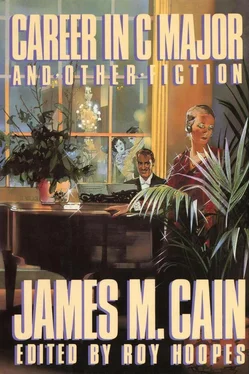James M. Cain was nearly 40 years old when he left New York for California, and although the magic spark he needed for his novels would not be ignited until he met the western roughneck, “the boy who is just as elemental inside as his eastern colleagues, but who has been to high school, completes his sentences and uses reasonably good grammar,” he was essentially formed as a writer. What the western characters enabled him to do was write in the first person about everyday people off the top of the pile, in such a way that his prose would not begin to grate after 50 pages and drive the reader mad with all the “ain’ts,” “brungs,” and “fittens,” which naturally came with the first-personal rural dialogue of the Eastern Shore. The Western (Pacific) Shore was different — and perfect for James M. Cain.
But he was still the same Cain of The Mercury dialogues, The World columns, and “Pastorale,” which he proved immediately with his first western short story — “Baby in the Icebox,” written for The Mercury. “Baby” was pure Cain: a couple of rubes involved in a comic situation and some underlying terror furnished by a man-eating tiger.
Then came Postman , which the critics and the public immediately perceived as something new and different — not the same old thing Cain had been writing all along. Although this annoyed Cain, he went along with the gag because it was bringing him, at 42, the fame and fortune which any writer his age would think was long overdue.
By 1936 Cain was firmly labeled a tough guy, and that was the way it would be for the rest of his life, although he continued to write stories and magazine and newspaper articles and columns that can hardly be typed or classified as hard-boiled. Cain always felt that how a writer was judged here and now did not really matter, that “Ol’ Man Posterity” would pin on the final label, no matter what the critics wrote.
It may well be that Old Man Posterity will agree with the critics and that James M. Cain will continue down through the years to be lumped with the tough guys. As I said, I do not intend to try to argue otherwise. However, I do think Posterity ought to know that this tough guy, at least, had another side, which liked food and music and animals and could see the comic, bumbling side of mankind as well as its darker aspects. This book is dedicated to revealing and preserving the human side of one of the preeminent tough guy writers of the 1930s, and I am sure that Cain would not object to my doing this. “I don’t lack for at least as much recognition as I deserve,” he said in his Preface to The Butterfly. But it won’t hurt to try to bring him a little more and for a different kind of writing — especially when reading it is so enjoyable.
The dialogues which Cain began writing for Mencken and The American Mercury in 1925 were cast in the form of one-act plays and lampooned various aspects of our federal, state, and local governments. He wrote these devastating satires for five years, by which time he had accumulated almost enough for a book. So, encouraged by Alfred A. Knopf, Cain wrote a few more to include in a little volume of satire titled Our Government , published by Knopf in 1930.
If Our Government had been the kind of success Knopf, Mencken, and several of the critics thought it should have been, James M. Cain might today be best known primarily as a satiric writer of comic dialogues. Mencken, especially, never understood why Our Government did not “create a sensation... there was capital stuff in it.”
To emphasize the satire, Cain wrote a pretentious tongue-in-cheek Preface to Our Government in which he suggested that his “studies” of government were the inevitable result of having made the transition into the scientific era. “We live in an age,” he said, “that has abandoned theory, except when theory can be made to serve as working hypothetic, in favor of fact. No longer do we start with cognito, ergo sum as a basis for deducing the principle of the universe; no longer do we believe that the principle of the universe can be deduced, or even stated. We incline to table such profundities as this in favor of things more objective: instead of concluding, by syllogistic processes, that since the patient is insane he must have a devil inside of him, we study his symptoms, trying to find out something about them; instead of indulging in great debates about the fairness of the income tax, we study the minutiae of economic phenomena, accumulating great columns of tables; instead of saying cognito, and letting it go at that, we study ourselves, seeking to find out how we cogitate, if at all. In other words, science has become descriptive.”
Science, said Cain, would hazard no opinion on the principle of the universe until it knew what the universe was like. And “this little book represents an effort to make a beginning in this direction on behalf of our American government, perhaps the most baffling riddle of all. We have, heaven knows, no dearth of books on the theory of our government, on its functions, its virtues, and its defects. The libraries are full of such books, and the courthouses are even fuller, for every judicial decision is in some degree an analysis of these matters, and many judicial decisions are lengthy. But there is no book, so far as I know, which sets out to paint a portrait of our government; to depict, without bias or comment, the machine which passes our laws, educates our children, and polices our streets; to show the kind of men who man it, the matters that occupy them, and the nature of their deliberations.”
His method of approach, he said, was “to select some typical problem of a particular branch of government, usually on the basis of newspaper clippings, and then reconstruct the manner in which it would be dealt with by the typical agents of that branch of government... While it has its limitations, it was the best method, I believe, with which to achieve complete verisimilitude, which after all was the main desideratum.”
Some of the reviewers completely missed the satire and were baffled by the contrasting serious tone of the Preface and the comic shenanigans that took place in the book. But most of them caught it, and some were positively ecstatic in their responses: John Carter, in Outlook , called Our Government a remarkably accurate picture of American politics and said, “It has just that touch of Aristophanes which is necessary to act as a preservative and make it as readable and comprehensible five centuries from now.”
Our Government has long been out of print, but over the years many of the satires have been produced as one-act plays by small theater groups. The dialogues included here are from the “State Government” section of Our Government, and all but two (“Counsel” and “The Judiciary”) originally appeared in The American Mercury. “The Governor” was also included in Katherine and E. B. White’s Subtreasury of American Humor , which always pleased Cain, who wrote Mrs. White in 1941: “The piece is one of the few things I have written that I have real affection for and it means almost more to me than I care to admit to have it in there.”
The last dialogue included here, “Don’t Monkey with Uncle Sam,” was written for Vanity Fair in 1933 and was an obvious attempt to revive the dialogue form for satirizing the government which had worked so well for Mencken, who left The Mercury in 1933. But it was Cain’s last effort at this type of satire.
THE GOVERNOR’S office, about two o’clock in the afternoon. Ranged about the table, talking in whispers, area petitioner for a pardon, dressed in ordinary clothes but having a pasty pallor, a singularly close haircut, and a habit of starting nervously whenever he is addressed; two guards, carrying guns on their hips in holsters; a witness, a prosecutor, and counsel for the petitioner. THE GOVERNOR enters, accompanied by a woman secretary, and they all stand up until he has sat down and donned his glasses. In a moment a lovely aroma begins to perfume the air. It is such an aroma as pervades a bonded distillery, and unmistakably it comes from the head of the table, where THE GOVERNOR has taken his place.
Читать дальше












